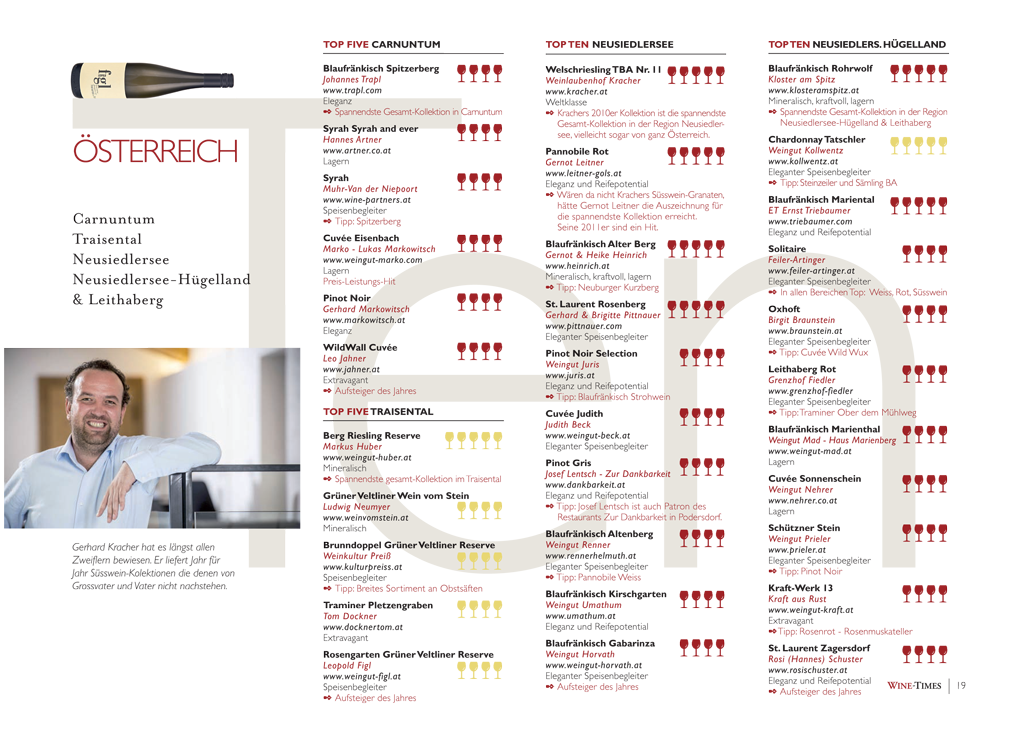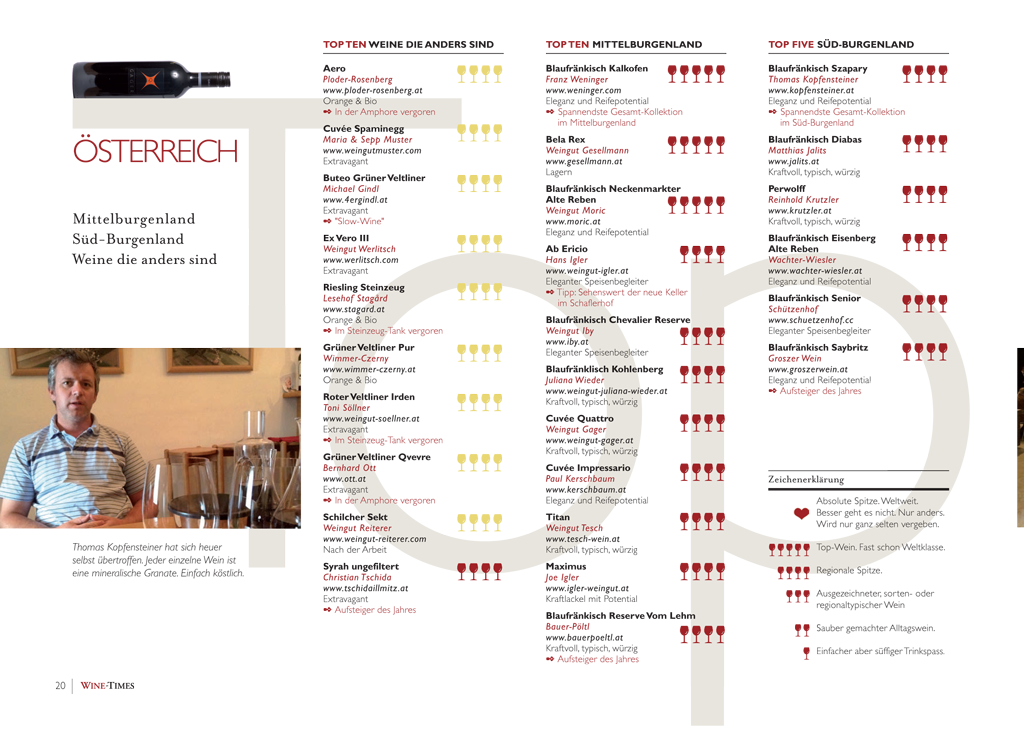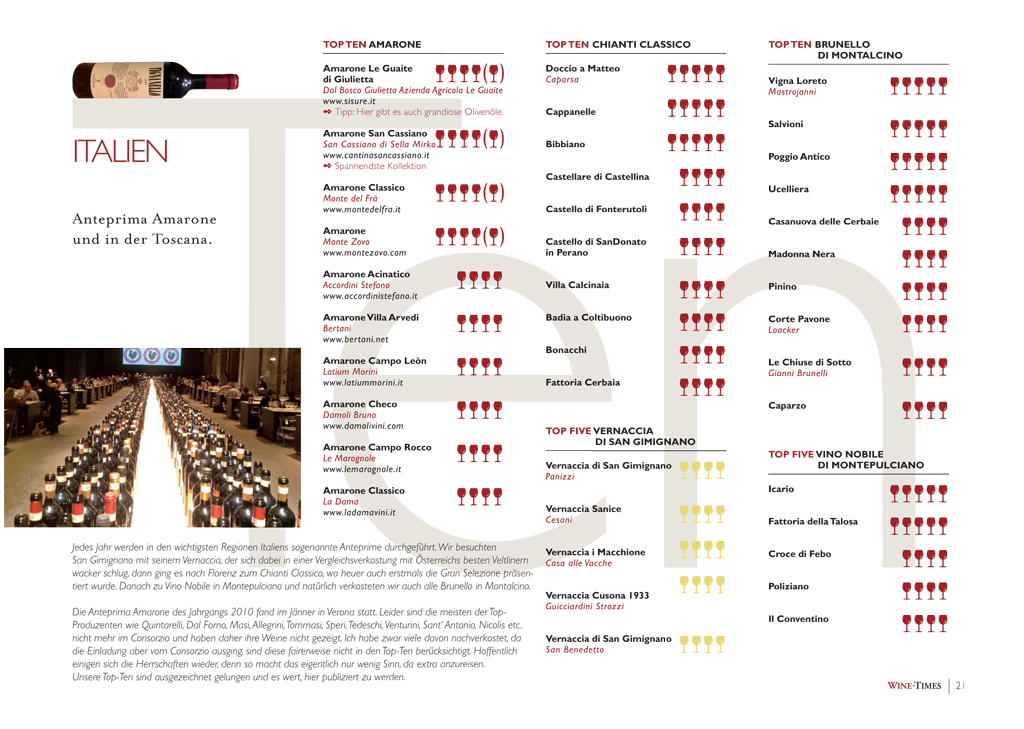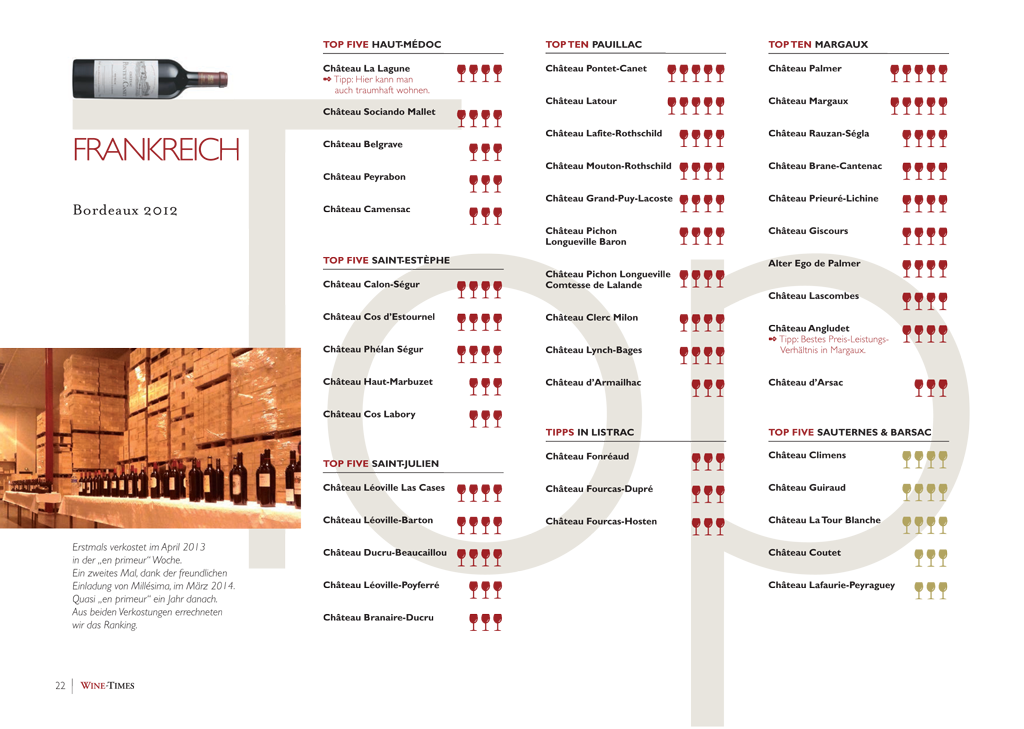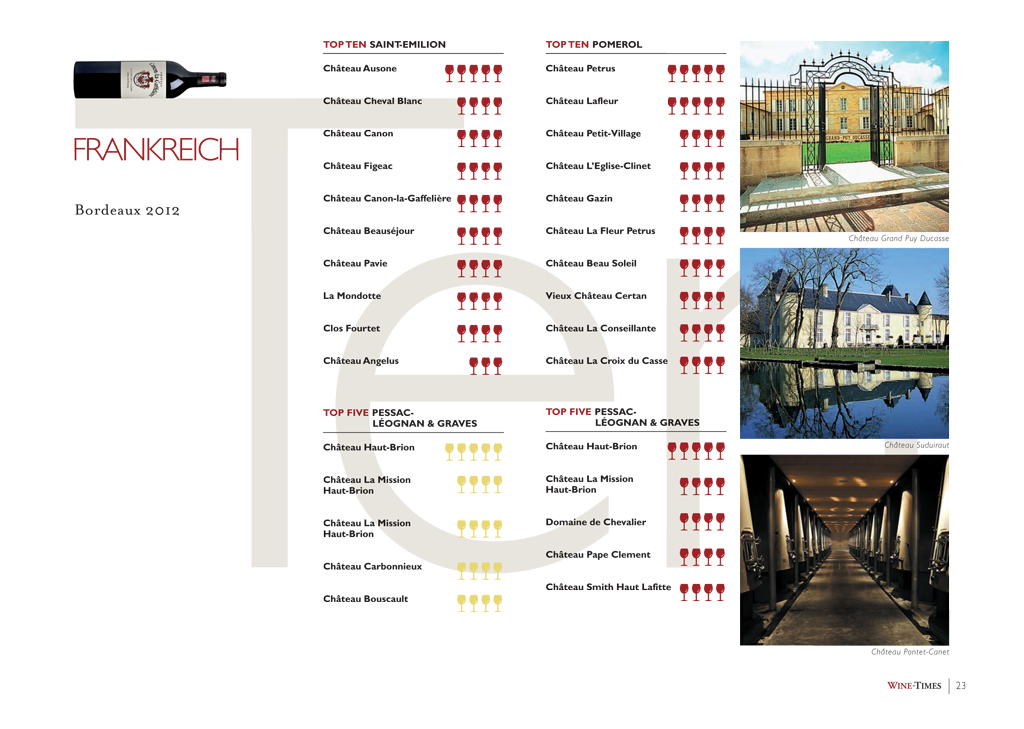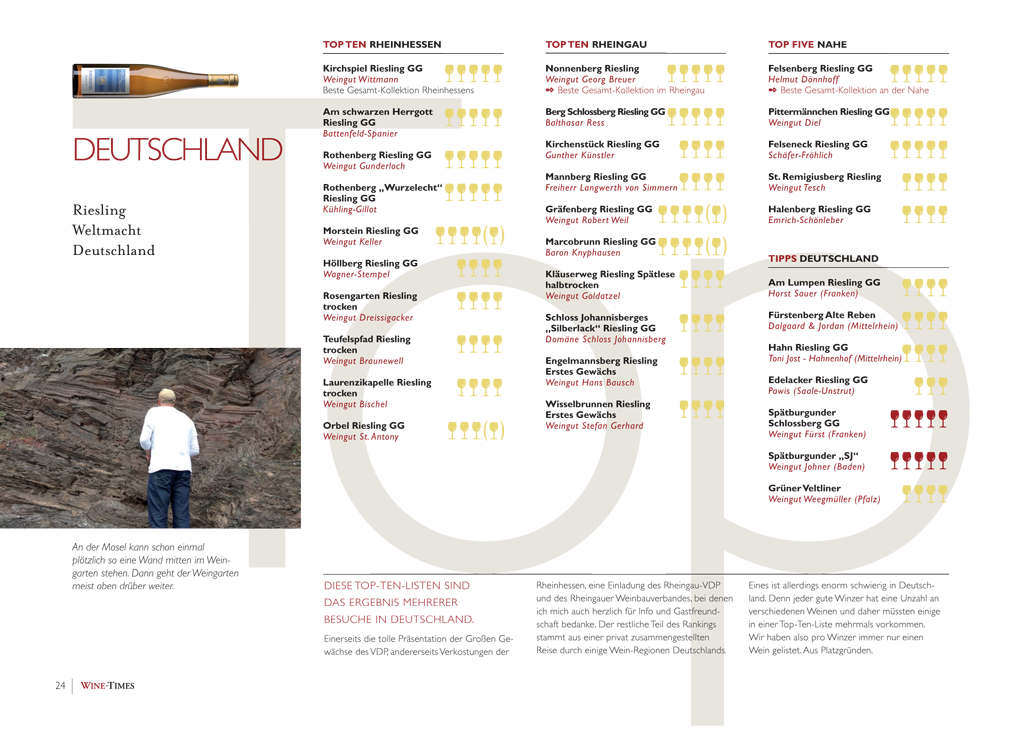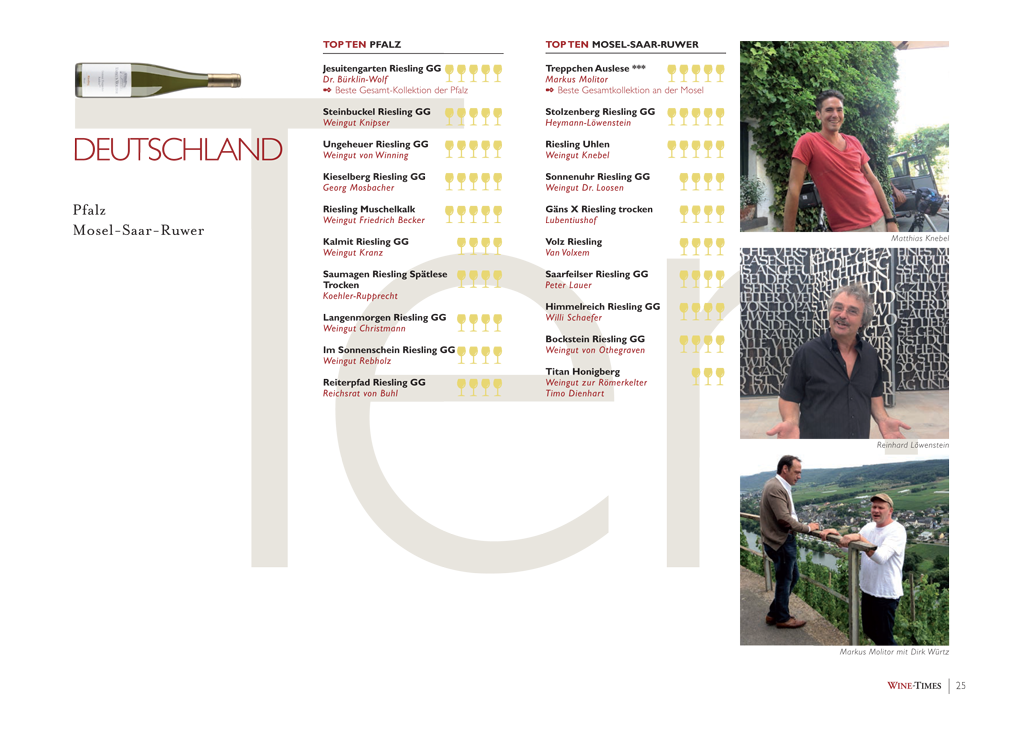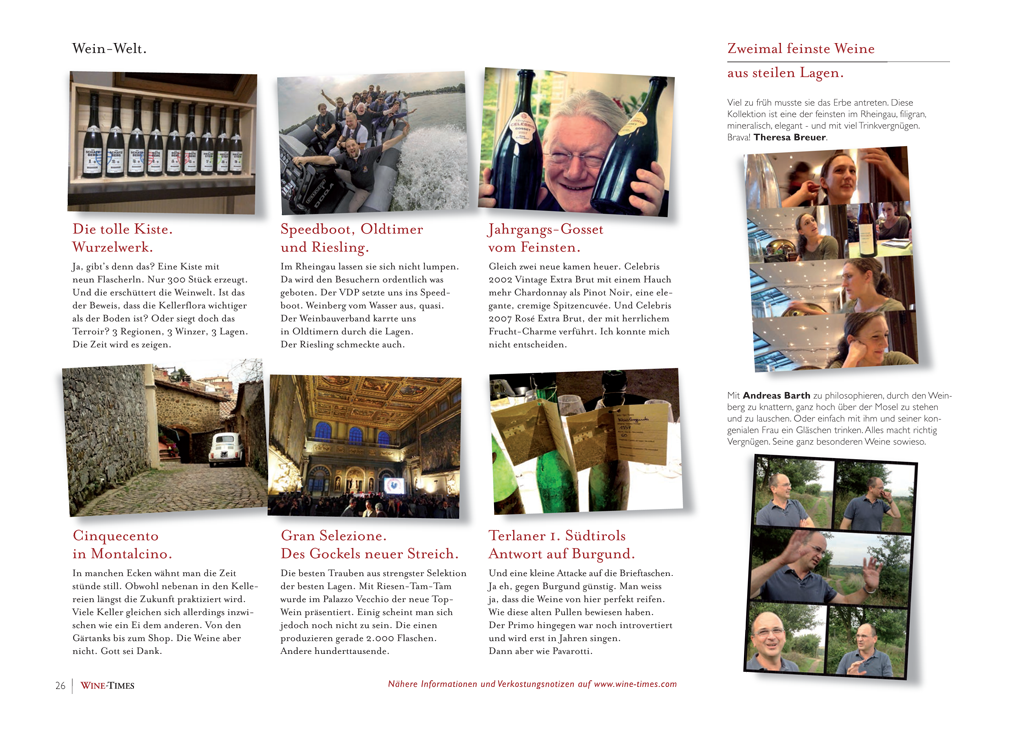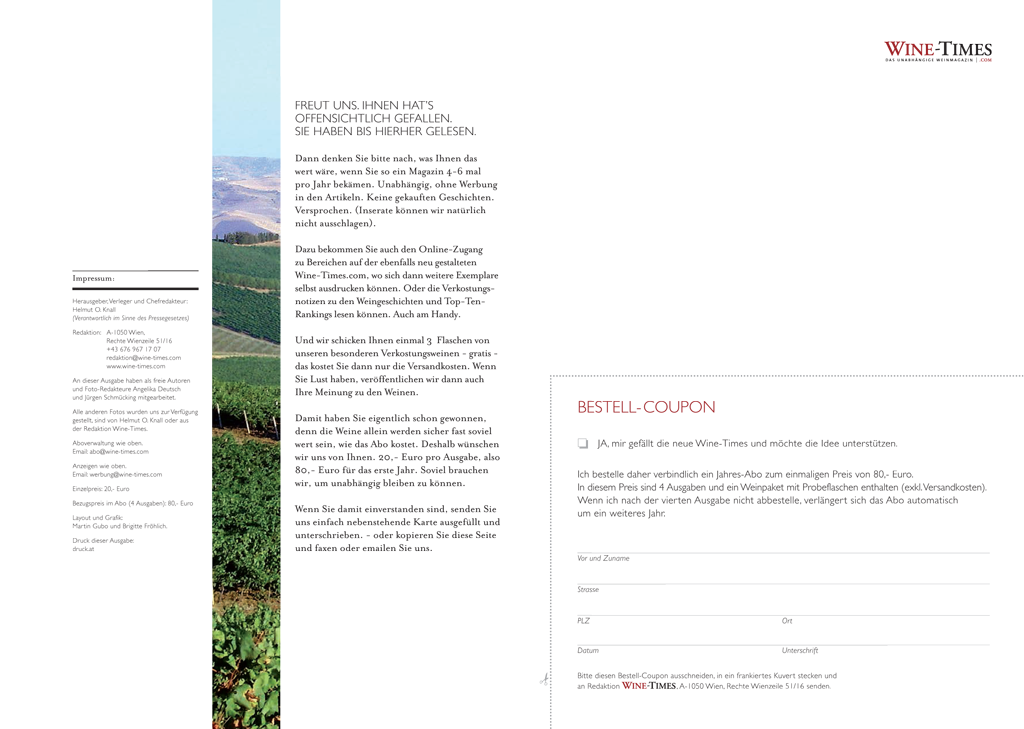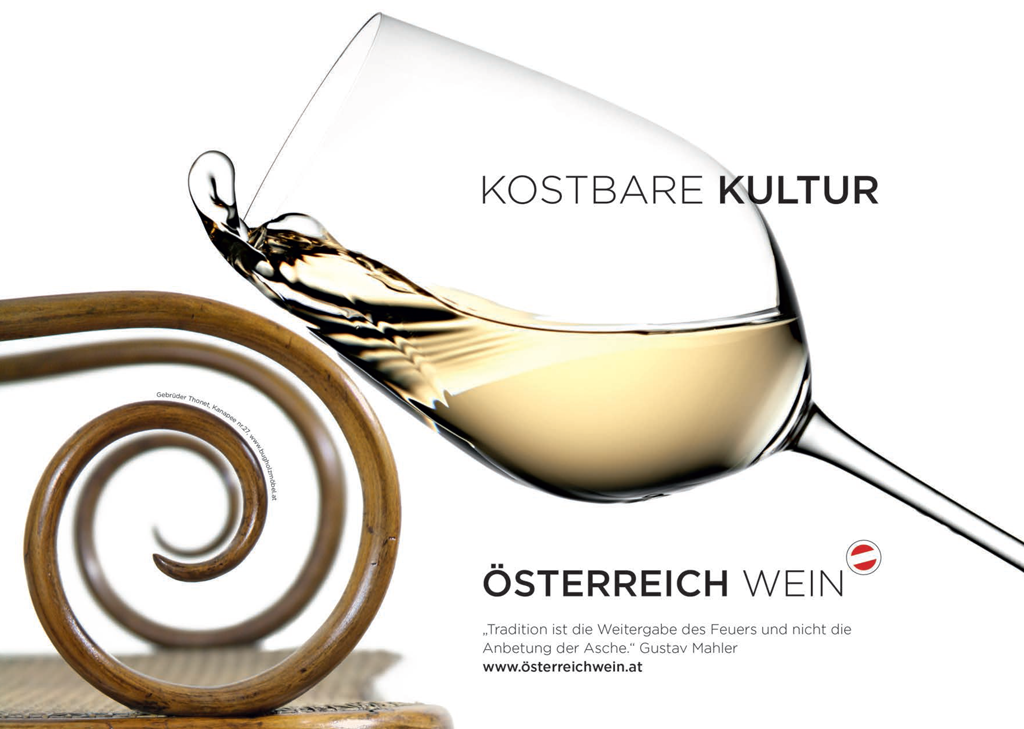Hier geht's zum aktuellen Wine-Guide-Austria in deutscher Sprache, dem ultimativen Nachschlagewerk zum österreichischen Wein.
"Wine Future" live at Rioja 2009.
A report from John Salvi, MW.
The title is somewhat misleading as the conference was about the future of the wine business from vine to wine throughout the world. It was supposed to enlighten us as to what was going to happen in the world of wine in the foreseeable future.

Count John U. Salvi, Master of Wine. Photo: Joe Haider.
Given the uncertain world that we live in today this was an almost impossible objective, and although there was a highly impressive line-up of top quality speakers I am not sure that we are much wiser after the event than we were before it. What we all hoped to learn was how to face the future. This through an exhaustive analysis of the present situation and perceptive prognostications of the tendencies to be expected in future years.
I hasten to say that this is not the fault of either the organisers or the speakers, many of whom were brilliant, but of the impossibility of predicting the future with any degree of accuracy, however perceptive or farsighted, in the present worldwide chaos and the world of rapid change in which we are living.
Regardless of one’s personal opinion of the event, and these varied hugely, it has to be said that it was in itself a vey considerable achievement and much of the praise has to go to Pancho Campo, the first Spanish Master of Wine, for gathering together such a magnificent array of world famous speakers and personalities under one roof and at the same time. Robert Parker was of course the main attraction, but Jancis Robinson and a host of others were almost equally attractive.
There were supposed to have been some 940 attendees, 40 nationalities, 40 speakers (the French were very distressed that they only had 2), 102 wineries exhibiting their wines and approximately 150 wineries/bodegas. The Grand Tasting used 20 sommeliers, 10,700 glasses and 600 bottles of Garnacha wines.
The prospectus described the “great challenges” as being: To listen and understand what consumers expect, to seduce the millennium generation (those who were 20 in 2000), to create and use a simple and coherent marketing system, to respect the environment and to educate the public. It was hoped that here would be a collection of speakers that would evaluate the challenges facing the wine sector. Among them: - Consumer tendencies, drops in sales, labelling, packaging, emerging markets and perhaps, most importantly, will internet be the motor??
The main sponsors were The Wine Academy of Spain, CRDO Rioja, Avis, ARAEX, Constellation Brands Europe, Spanish Fine Wines, Marqués de Riscal, Dinostia Vivanco. The list of speakers reads like the WHO’S WHO directory: (Salvador tu puedes suprimir esta lista si quieres!!!)
Robert Parker, Pancho Campo, Kevin Zraly, David Cunningham, Matthieu Chadronnier, Richard Halstead, Tim Hanni, M.W., Rafael Anson, Esteban Cabezas, Gary Vaynerchuk, Ryan Opaz, Juan Such Juan, José Penin,
Steven Spurrier, Jancis Robinson, M.W., Manuel Julia, Mel Dick, Baudouin Havaux, Rocio Alberdi, Robert Joseph, Justin Howard-Sneyd, M.W., Quim Vila, Christian Barre, Charlotte Hey, Lisa Perrotti-Brown, M.W., Dimitry Pinsky, Ulf Sjodin, M.W., Don St. Pierre, Felicity Carter, Jeremy Benson, Victor Pascual, Nicola Jenkin, Miguel Torres, Enerterra,
Dan Jago, Jorge Ordonez, Paul Pontallier, Christopher Cannan,
In addition, the event, although expensive by any standards, was completely sold out well in advance, both the ordinary tickets and the VIP ones that gave access to the Parker Grenache Tasting and the Gala Dinner. All the tickets gave access to the conferences, lunches and wine stands.
The Rioja Forum is a splendiferous, modern building with superb facilities, air conditioning and lighting. It is hugely spacious and airy and perfect for impressively large events, except for the Press Room, which was pathetic and primitive. Two computers that worked sporadically to handle the 200 journalists that we were told would attend the event. This created real problems for those who had to meet deadlines.
Personally I was treated royally and had little to complain about. I had received an invitation with a VIP ticket and three nights of lodging in the only hotel immediately opposite the Forum. For this I have to thank Pancho Campo. Also, having considerable experience of such symposiums, my wife and I (she was registered as Press) registered the day before with nobody else around. We spent a quiet evening in a local restaurant, while the speakers, who were lodged at the amazing Marqués de Riscal hotel in Elciego, were wined and dined until late. We were fresh as daisies the next morning!
The programme was very tightly packed with one set of speakers following rapidly upon the previous one. There is no point, and certainly not enough space, to resume all of the speeches, however briefly. Out of the 2 days of solid speeches, I have picked out the points that I, personally, found the most important and/or salient. Others may entirely disagree with what I say, but there is a veritable mass of literature available if readers care to look more deeply or do not believe me.
The first session was "LA CRISIS ECONOMICA Y EL SECTOR VINICOLA" presented by the GOBIERNO DE LA RIOJA.
Chadronnier underlined that the Bordeaux Wine World is going through a crisis and requires a radical restructuration. Much of this crisis had already struck BEFORE the world wide recession. He told us that the Bordeaux system of production and distribution was adapted to the Grands Crus wines but totally unsuited to all the rest (the vast majority). The problem is fragmentation. 10,000 producers and 400 Négociants sell 70% of the production. The region simply cannot support all this. We were told that people are eating out less and off-trade is increasing whilst on-trade is diminishing. Price reductions and promotions are essential to sell in the present situation and certainly in the future.
It was followed by COMO MEJORAR LAS VENTAS EN EL CANAL HORECA presented by REAL ACADEMIA ESPANOLA DE GASTRONOMIA.
Here we had a truly brilliant exposition by Tim Hanni, an American Master of Wine, both humorous and deeply psychological. He said that we should embrace and exhilarate all wine consumers and personalise their wine experiences if we wanted to maintain and increase their interest and consumption.
The last session of the morning was LAS POSIBILIDADES QUE OFRECE INTERNET presented by MERCADOS DEL VINO Y LA DISTRIBUCION.
Ryan Opaz said “you need to know wine to love wine” – not very helpful! The wild and wonderful American, Gary Vaynerchuk, who strode around the stage and harangued us with a tirade worthy of Billy Graham, in a strong American accent, informed us how he had made his fortune, largely through internet, and how incredibly stupid we all were not to have done the same! Exhilarating and totally off-beat he enlivened the proceedings and was vociferously applauded. He did say, very pertinently, that the world is changing fast and what nobody could have imagined is that cell phone technology or social networks such as Facebook and Twitter would be our basis for growth. He said “I can now talk and be recorded and watched by millions of people at the same time while I drink wine. The impact is colossal. This is the key contribution to today’s technologies”. He also said aptly “improve your website and FORCE people to look at it. Facebook, with 300 million subscribers, can sell enormous quantities of wine for you if you pitch it right”.
A stand up lunch followed in the main hall where the exhibitors had their wine tables. It was offered by ARAEX AND SPANISH FINE WINES. A series of delicious Spanish tapas was brought round by a series of delicious Spanish senoritas, the only problem being that they were trying to feed 500 in a space big enough for 200 and with enough food for 100! To be adequately fed one either had to be a very beautiful lady or a rugby champion and I am neither!
After lunch we sat down to digest and listen to LA PRENSA Y LOS CRITICOS ANTE EL FUTURO DEL SECTOR presented by FIJEV/AEPEV.
Gary was back as wild as ever. There were also famous names such as Steven Spurrier, José Peñin, and Jancis Robinson who was the moderator. Oz Clarke was absent in hospital with a “twisted gut”. We were presented with a fascinating multitude of facts and figures and masses of information, but almost nothing about the future, which was really what we were waiting for. This was a great pity as our expectations had been high!
COMO MEJORAR LAS VENTAS Y EL CONSUMO ATRAVES DE FERIAS Y CONCURSOS presented by ICEX-WINES FROM SPAIN, with Robert Joseph as moderator, was next on the agenda.
Although he was the moderator, his was the most brilliant talk. In his usual staccato style, he told us that there were 32 accredited Wine Tasting Competitions today (where did he get these strange statistics, the OIV gives patronage to 21??) and asked which, if any, benefitted us most? Baudouion, who runs the Concours Mondial de Bruxelles, told us that one of the problems was lack of confidence both in the results of the tastings and in the judges, whilst the main objective was to help producers promote their wines. This was at least pragmatic. Mel Dick said that trade fairs and congresses bring with them both new ideas and considerations. Also women and young people in the USA are both vitally important and big consumers. Again there was nothing about the future and he admitted that the public were hugely confused about the profusion of medals and their possible value.
This led us to the great event of the entire symposium, the chief reason that so many people had come here and almost the “raison d’être” of the whole event – CATA MAGISTRAL CON ROBERT PARKER JUNIOR. It was moderated by Pancho Campo and Kevin Zraly. Pancho kept a low profile whilst Zraly, thinking he was being helpful, interjected remarks at intervals, which did little to assist Parker.
I have known Robert Parker since soon after he started the Wine Advocate in 1978, when we were both living in Washington. We have had our differences, but I have seen him grow in fame and stature and acquire both tremendous influence and colossal arrogance as well as putting on weight. Today, surely drawing close to the end of his status as a super guru, the arrogance was gone and a moderate, perceptive, knowledgeable and thoroughly likeable Parker was there to present 20 Garnacha wines from different countries. He was restrained in his opinions, modest and understanding of the wines, and deserves great praise for a superb performance. It was claimed that this was the largest ever tutored tasting, with 523 tasters gathered together in the same room and with the tickets sold out within days of the tasting being announced. Thousands lined the stairs hoping for a chance to enter. My very sincerest thanks to Pancho Campo for providing me with one of the much sought-after tickets.
A WINE AND CULTURE DINNER followed this momentous event, at the DINASTIA VIVANCO BODEGAS in the MUSEO DE LA CULTURA DEL VINO.
What truly charming, generous and utterly delightful people the Vivanco family are, and what an amazing and mind-boggling museum they have created. For an hour we toured the museum, discovering various glasses of their wine and delicious tapas in hidden corners scattered along the way. We then sat down to a sumptuous dinner that was both delicious and gastronomic, but also horrifyingly late. We started eating at 11.15pm and were delivered back to our various hotels, by bus, at 02.30am. This was too late for me.
The second day was just as crowded. It started somewhat late, which was hardly surprising as all the speakers had been at last night’s dinner. The first subject was LA CRISIS EN EL OFF-TRADE – NUEVAS ESTRATEGIAS presented by DOMECQ BODEGAS.
Many people think that Friday 13th is an unlucky day so would it be for us? It was not! Justin Howard-Sneyd (Waitrose), a Master of Wine, gave a brilliant talk, this time really about the future. Rosé wine may lose its popularity. Spritzers (which he termed Frankenstein Wines) will grow in strength and volume. Wine tourism will grow exponentially. Smaller independent wine companies will flourish. Social networking, internet and mobile telephones will allow more and more trading between private persons. This was really useful information.
We moved on to MERCADOS EMERGENTES presented by MARQUES DE RISCAL.
Naturally they concentrated on China, Asia, Russia and for some inexplicable reason Scandinavia (a very old market) and not India. Two Masters of Wine spoke – Lisa Perrotti-Brown and Ulf Sjodin. Regretfully, all they could tell us, which we all knew already, was to concentrate on quality and expand our export markets since world consumption is growing and the public is greedy for more and more information. We should be grateful, we were told, that wine is less affected by the present world crisis than clothing. Wow people, big deal!!! We were not told how to attack and deal with these emerging markets, which is what we really needed to know.
Now came BRANDING: EL FUTURO DE LAS MARCAS presented by CRDO RIOJA.
This brought us one of the best talks of the entire Symposium, by Robert Joseph, who talked about confusion between brands and unknown denominations. Brands are TOTALLY essential, even more so than price. There will be fewer and fewer appellations in the future, fewer wineries and fewer denominations. There must be a clearer division between beverage wines and fine wines. Wine will no longer automatically be thought of as coming to the consumer in glass bottles. Expect fewer and weaker critics, more online chatter and much more online information. Beware of “quick” wines. Both internet and the Press are of vital importance, but whoever you are and whatever you are trying to do just remember “brands, brands, brands”. Also “packaging”, make it as attractive as possible. The other speakers informed us that it is better to develop one’s own sales staff and to work through regional distributors since these emerging countries have at present very low brand consciousness. Also smuggling is a huge problem and represents real competition. These countries also have very few knowledgeable wine writers and relatively little wine education. Also law enforcement is inconsistent and often depends upon personal and family relationships. Perhaps this was one of the more future orientated subjects. A lot of what we heard here could also refer to MERCADOS EMERGENTES (the previous subject).
This led us to lunch, offered today by IPEX, which was regretfully non existent except for those who had left the speeches early, or not listened at all, or put on their rugby boots. It was all consumed in a flash and the only stand that went on cutting delicious ham, sausages and cheese was that of the wines of Aragon! Not quite what one expected when the invitation proclaimed “Wines from Don Quixote’s Spain have the pleasure to invite you to the Wines from Castilla-La Mancha Lunch by Restaurant Locum from Toledo, Spain”.
The last afternoon had the usual three presentations. The first was OPORTUNIDADES DE NEGOCIO QUE OFRECEN EL CAMBIO CLIMATICO Y EL MEDIO AMBIENTE, presented by ENERTERRA and moderated by Pancho Campo.
The presence of Pancho was hardly surprising, as one of the best known events organised by him had been the CLIMATE GLOBAL WARMING conference in Barcelona. It was interesting and fun, but basically conjectural, and told us little about the future of our wine trade.
Miguel Torres however detailed the very real and positive actions that he is taking to reduce carbon footprints and he should be hugely admired and congratulated for this. Nicola Jenk reminded us that lighter bottles and packaging save a great deal of carbon footprints (CO2).
In the middle of the afternoon came COMO MEJORAR LAS VENTAS Y EL CONSUMO ATRAVES DE LA EDUCACION presented by DINASTIA VIVANCO BODEGAS Y MUSEO DE LA CULTURA DEL VINO. Great talkers but what a monumental task?? When one thinks of the time and effort expended so that just a few people even know what denominación de origen means or can name just 10 French, Spanish or Italian wines, one has to wonder if education can reach enough of the massive public to make any serious difference to sales. Hats off however to our speakers for even trying! Clive Barlow moderated this brilliantly.
The last subject of the day should have been, and very much was, one of the most interesting, exciting and instructive. RETOS Y OPORTUNIDADES PARA LA INDUSTRIA VINICOLA presented by ARAEX AND SPANISH FINE WINES.
Fabulous speakers: Jancis Robinson, Robert Parker, Paul Pontallier (winemaker of Château Margaux), Justin Howard-Sneyd, Jorge Ordonez, Don St. Pierre, Christopher Cannan and Mel Dick. It turned into something of a question and answer session and showed the enormous number of points that concerned the audience. Paul Pontallier said what a shame it was that the French Government took such a negative view of wine. Also that there was still too great a production of bad wine and this spoiled the image of the great wine by giving a furtive, negative image. The French Government spoils everything, including France’s chances of competivity, by its prohibitionist treatment of the wine world. Justin said wine is seen too much as a speculative business instead of a pleasurable drink. It was also said that we are now undergoing a crisis of overproduction, both in Europe and the Southern Hemisphere, and there needs to be massive correction. Most wine investment funds are rather pathetic, being concerned entirely with money and not the pleasure of wine. How do we kick-start consumption?? Answer, BRANDS of course and events like this one. Consumers must be educated and food has a role to play. Wine scares a lot of people off as they feel they need too much knowledge. Jancis said that wine has been made too special, the pro-wine lobby is weak and the anti-wine lobby extremely strong. Make wine more friendly, less snobbish. Another said that although there is a huge choice, there is still too much bad wine produced in the world. We MUST send a positive message to beer drinkers and basic wine knowledge should also be taught in schools. Parker rightly said how odd it is that France is now puritanical about wine, whereas the USA were the original puritans with their prohibition, but are now among the most open minded and liberal. He humorously said ”I have great power, but not enough to change the situation!!” We were also told what we already knew, that wine is overtaxed and profit margins are too high. The poor producer never sees any of this money. Paul Pontallier said that parents play a vital role and the way they drink, or do not drink, at home, will have a tremendous influence on the children’s approach to wine as they grow up. Jancis struck a positive note saying how encouraging it was that so many young people were interested in wine and saw it as one of the joys of life, in spite of the figures that show that more and more people are not drinking wine at all. Blogs play a role, but many are misleading and even rubbish so one must be very careful. She made some remarks that have been given huge media coverage and which some pretend, although I absolutely do not, that they were referring to Robert Parker - “the time of the wine gurus is over. We journalists need to learn to be something more than just wine writers. We need to record videos, take photos, create opinions and use new networks. The viewer and the consumer are the critics now rather than us”. Cannan said that labelling is the only place where the grower puts his wares on view and a lot of attention should be paid to them. Many would like to see growers concentrate on autochthonous grape varieties, but a great growth like Margaux must live with its history (Paul). Justin summed up with six vital points: current prices, the credit crunch, the economy, globalisation, consumer understanding and consumer interaction. Finally a greater respect for nature will naturally and gradually increase consumption because wine is the most natural, hygienic and healthy drink imaginable! It was a pot-pourri, but a useful, necessary and enlightening one to wind-up the symposium.
A Grand Gala Dinner closed the event. We were all so much looking forward to a wonderful evening and a gastronomic dinner. In the event it was deeply disappointing. The talks finished around 19.30 and the dinner was scheduled for 21.30. The speakers had no chance to go back to their hotels to wash and change and a cocktail party gradually got under way and grew and grew. Everybody joined in, speakers, staff, attendees and people who were showing their wines on their stands. Food and drink rapidly ran out. When we went in to dinner many people had left and many tables were half empty. Finally the food was extremely ordinary and the dinner did not finish until around 01.00am. It took place at the Riojaforum and was presented by ARAEX & SFW – GRUPO CORDONIU - PEREZ BARQUERO under the auspices of GRUPO CORDONIU. It was a sad finish to a monumental event and one better forgotten.
Perhaps it would be worth readers visiting the website www.winefuture.es.
While I very much enjoyed the event, and while I hugely admire the initiative and capability of Pancho Campo in gathering together such an illustrious group of famous personalities, and indeed would very much like to go to the next one, I may be, as the bible says, “a lone voice crying in the wilderness”, but I do not believe that it was, as Jancis Robinson is supposed to have said, “the finest event at which I have ever assisted”.
Being a natural born cynic I contacted her directly and asked her about this. Her reply, verbatim, was “Yes I happened to see that, which seems something of an overstatement. I’ll ask them where they took the quote from”. Sadly this puts in doubt the comments that some of the other speakers are supposed to have made. Parker is supposed to have said “this will create a before and an after in the wine industry”, Rafael Anson “this has been the most important wine event ever held in Spain” and Peñin “many congresses talk much but concretise little. Not this one”. In all honesty there was not enough about the “future of wine” and this was the title of the symposium.
Next edition please make absolutely sure that that is what the speakers concentrate upon as that is what we all so badly need! The future remains a mystery and perhaps that is the way that it should be! Perhaps we shall learn more if the second edition is held, as suggested, in October 2011?
I hasten to say that this is not the fault of either the organisers or the speakers, many of whom were brilliant, but of the impossibility of predicting the future with any degree of accuracy, however perceptive or farsighted, in the present worldwide chaos and the world of rapid change in which we are living.
Regardless of one’s personal opinion of the event, and these varied hugely, it has to be said that it was in itself a vey considerable achievement and much of the praise has to go to Pancho Campo, the first Spanish Master of Wine, for gathering together such a magnificent array of world famous speakers and personalities under one roof and at the same time. Robert Parker was of course the main attraction, but Jancis Robinson and a host of others were almost equally attractive.
There were supposed to have been some 940 attendees, 40 nationalities, 40 speakers (the French were very distressed that they only had 2), 102 wineries exhibiting their wines and approximately 150 wineries/bodegas. The Grand Tasting used 20 sommeliers, 10,700 glasses and 600 bottles of Garnacha wines.
The prospectus described the “great challenges” as being: To listen and understand what consumers expect, to seduce the millennium generation (those who were 20 in 2000), to create and use a simple and coherent marketing system, to respect the environment and to educate the public. It was hoped that here would be a collection of speakers that would evaluate the challenges facing the wine sector. Among them: - Consumer tendencies, drops in sales, labelling, packaging, emerging markets and perhaps, most importantly, will internet be the motor??
The main sponsors were The Wine Academy of Spain, CRDO Rioja, Avis, ARAEX, Constellation Brands Europe, Spanish Fine Wines, Marqués de Riscal, Dinostia Vivanco. The list of speakers reads like the WHO’S WHO directory: (Salvador tu puedes suprimir esta lista si quieres!!!)
Robert Parker, Pancho Campo, Kevin Zraly, David Cunningham, Matthieu Chadronnier, Richard Halstead, Tim Hanni, M.W., Rafael Anson, Esteban Cabezas, Gary Vaynerchuk, Ryan Opaz, Juan Such Juan, José Penin,
Steven Spurrier, Jancis Robinson, M.W., Manuel Julia, Mel Dick, Baudouin Havaux, Rocio Alberdi, Robert Joseph, Justin Howard-Sneyd, M.W., Quim Vila, Christian Barre, Charlotte Hey, Lisa Perrotti-Brown, M.W., Dimitry Pinsky, Ulf Sjodin, M.W., Don St. Pierre, Felicity Carter, Jeremy Benson, Victor Pascual, Nicola Jenkin, Miguel Torres, Enerterra,
Dan Jago, Jorge Ordonez, Paul Pontallier, Christopher Cannan,
In addition, the event, although expensive by any standards, was completely sold out well in advance, both the ordinary tickets and the VIP ones that gave access to the Parker Grenache Tasting and the Gala Dinner. All the tickets gave access to the conferences, lunches and wine stands.
The Rioja Forum is a splendiferous, modern building with superb facilities, air conditioning and lighting. It is hugely spacious and airy and perfect for impressively large events, except for the Press Room, which was pathetic and primitive. Two computers that worked sporadically to handle the 200 journalists that we were told would attend the event. This created real problems for those who had to meet deadlines.
Personally I was treated royally and had little to complain about. I had received an invitation with a VIP ticket and three nights of lodging in the only hotel immediately opposite the Forum. For this I have to thank Pancho Campo. Also, having considerable experience of such symposiums, my wife and I (she was registered as Press) registered the day before with nobody else around. We spent a quiet evening in a local restaurant, while the speakers, who were lodged at the amazing Marqués de Riscal hotel in Elciego, were wined and dined until late. We were fresh as daisies the next morning!
The programme was very tightly packed with one set of speakers following rapidly upon the previous one. There is no point, and certainly not enough space, to resume all of the speeches, however briefly. Out of the 2 days of solid speeches, I have picked out the points that I, personally, found the most important and/or salient. Others may entirely disagree with what I say, but there is a veritable mass of literature available if readers care to look more deeply or do not believe me.
The first session was "LA CRISIS ECONOMICA Y EL SECTOR VINICOLA" presented by the GOBIERNO DE LA RIOJA.
Chadronnier underlined that the Bordeaux Wine World is going through a crisis and requires a radical restructuration. Much of this crisis had already struck BEFORE the world wide recession. He told us that the Bordeaux system of production and distribution was adapted to the Grands Crus wines but totally unsuited to all the rest (the vast majority). The problem is fragmentation. 10,000 producers and 400 Négociants sell 70% of the production. The region simply cannot support all this. We were told that people are eating out less and off-trade is increasing whilst on-trade is diminishing. Price reductions and promotions are essential to sell in the present situation and certainly in the future.
It was followed by COMO MEJORAR LAS VENTAS EN EL CANAL HORECA presented by REAL ACADEMIA ESPANOLA DE GASTRONOMIA.
Here we had a truly brilliant exposition by Tim Hanni, an American Master of Wine, both humorous and deeply psychological. He said that we should embrace and exhilarate all wine consumers and personalise their wine experiences if we wanted to maintain and increase their interest and consumption.
The last session of the morning was LAS POSIBILIDADES QUE OFRECE INTERNET presented by MERCADOS DEL VINO Y LA DISTRIBUCION.
Ryan Opaz said “you need to know wine to love wine” – not very helpful! The wild and wonderful American, Gary Vaynerchuk, who strode around the stage and harangued us with a tirade worthy of Billy Graham, in a strong American accent, informed us how he had made his fortune, largely through internet, and how incredibly stupid we all were not to have done the same! Exhilarating and totally off-beat he enlivened the proceedings and was vociferously applauded. He did say, very pertinently, that the world is changing fast and what nobody could have imagined is that cell phone technology or social networks such as Facebook and Twitter would be our basis for growth. He said “I can now talk and be recorded and watched by millions of people at the same time while I drink wine. The impact is colossal. This is the key contribution to today’s technologies”. He also said aptly “improve your website and FORCE people to look at it. Facebook, with 300 million subscribers, can sell enormous quantities of wine for you if you pitch it right”.
A stand up lunch followed in the main hall where the exhibitors had their wine tables. It was offered by ARAEX AND SPANISH FINE WINES. A series of delicious Spanish tapas was brought round by a series of delicious Spanish senoritas, the only problem being that they were trying to feed 500 in a space big enough for 200 and with enough food for 100! To be adequately fed one either had to be a very beautiful lady or a rugby champion and I am neither!
After lunch we sat down to digest and listen to LA PRENSA Y LOS CRITICOS ANTE EL FUTURO DEL SECTOR presented by FIJEV/AEPEV.
Gary was back as wild as ever. There were also famous names such as Steven Spurrier, José Peñin, and Jancis Robinson who was the moderator. Oz Clarke was absent in hospital with a “twisted gut”. We were presented with a fascinating multitude of facts and figures and masses of information, but almost nothing about the future, which was really what we were waiting for. This was a great pity as our expectations had been high!
COMO MEJORAR LAS VENTAS Y EL CONSUMO ATRAVES DE FERIAS Y CONCURSOS presented by ICEX-WINES FROM SPAIN, with Robert Joseph as moderator, was next on the agenda.
Although he was the moderator, his was the most brilliant talk. In his usual staccato style, he told us that there were 32 accredited Wine Tasting Competitions today (where did he get these strange statistics, the OIV gives patronage to 21??) and asked which, if any, benefitted us most? Baudouion, who runs the Concours Mondial de Bruxelles, told us that one of the problems was lack of confidence both in the results of the tastings and in the judges, whilst the main objective was to help producers promote their wines. This was at least pragmatic. Mel Dick said that trade fairs and congresses bring with them both new ideas and considerations. Also women and young people in the USA are both vitally important and big consumers. Again there was nothing about the future and he admitted that the public were hugely confused about the profusion of medals and their possible value.
This led us to the great event of the entire symposium, the chief reason that so many people had come here and almost the “raison d’être” of the whole event – CATA MAGISTRAL CON ROBERT PARKER JUNIOR. It was moderated by Pancho Campo and Kevin Zraly. Pancho kept a low profile whilst Zraly, thinking he was being helpful, interjected remarks at intervals, which did little to assist Parker.
I have known Robert Parker since soon after he started the Wine Advocate in 1978, when we were both living in Washington. We have had our differences, but I have seen him grow in fame and stature and acquire both tremendous influence and colossal arrogance as well as putting on weight. Today, surely drawing close to the end of his status as a super guru, the arrogance was gone and a moderate, perceptive, knowledgeable and thoroughly likeable Parker was there to present 20 Garnacha wines from different countries. He was restrained in his opinions, modest and understanding of the wines, and deserves great praise for a superb performance. It was claimed that this was the largest ever tutored tasting, with 523 tasters gathered together in the same room and with the tickets sold out within days of the tasting being announced. Thousands lined the stairs hoping for a chance to enter. My very sincerest thanks to Pancho Campo for providing me with one of the much sought-after tickets.
A WINE AND CULTURE DINNER followed this momentous event, at the DINASTIA VIVANCO BODEGAS in the MUSEO DE LA CULTURA DEL VINO.
What truly charming, generous and utterly delightful people the Vivanco family are, and what an amazing and mind-boggling museum they have created. For an hour we toured the museum, discovering various glasses of their wine and delicious tapas in hidden corners scattered along the way. We then sat down to a sumptuous dinner that was both delicious and gastronomic, but also horrifyingly late. We started eating at 11.15pm and were delivered back to our various hotels, by bus, at 02.30am. This was too late for me.
The second day was just as crowded. It started somewhat late, which was hardly surprising as all the speakers had been at last night’s dinner. The first subject was LA CRISIS EN EL OFF-TRADE – NUEVAS ESTRATEGIAS presented by DOMECQ BODEGAS.
Many people think that Friday 13th is an unlucky day so would it be for us? It was not! Justin Howard-Sneyd (Waitrose), a Master of Wine, gave a brilliant talk, this time really about the future. Rosé wine may lose its popularity. Spritzers (which he termed Frankenstein Wines) will grow in strength and volume. Wine tourism will grow exponentially. Smaller independent wine companies will flourish. Social networking, internet and mobile telephones will allow more and more trading between private persons. This was really useful information.
We moved on to MERCADOS EMERGENTES presented by MARQUES DE RISCAL.
Naturally they concentrated on China, Asia, Russia and for some inexplicable reason Scandinavia (a very old market) and not India. Two Masters of Wine spoke – Lisa Perrotti-Brown and Ulf Sjodin. Regretfully, all they could tell us, which we all knew already, was to concentrate on quality and expand our export markets since world consumption is growing and the public is greedy for more and more information. We should be grateful, we were told, that wine is less affected by the present world crisis than clothing. Wow people, big deal!!! We were not told how to attack and deal with these emerging markets, which is what we really needed to know.
Now came BRANDING: EL FUTURO DE LAS MARCAS presented by CRDO RIOJA.
This brought us one of the best talks of the entire Symposium, by Robert Joseph, who talked about confusion between brands and unknown denominations. Brands are TOTALLY essential, even more so than price. There will be fewer and fewer appellations in the future, fewer wineries and fewer denominations. There must be a clearer division between beverage wines and fine wines. Wine will no longer automatically be thought of as coming to the consumer in glass bottles. Expect fewer and weaker critics, more online chatter and much more online information. Beware of “quick” wines. Both internet and the Press are of vital importance, but whoever you are and whatever you are trying to do just remember “brands, brands, brands”. Also “packaging”, make it as attractive as possible. The other speakers informed us that it is better to develop one’s own sales staff and to work through regional distributors since these emerging countries have at present very low brand consciousness. Also smuggling is a huge problem and represents real competition. These countries also have very few knowledgeable wine writers and relatively little wine education. Also law enforcement is inconsistent and often depends upon personal and family relationships. Perhaps this was one of the more future orientated subjects. A lot of what we heard here could also refer to MERCADOS EMERGENTES (the previous subject).
This led us to lunch, offered today by IPEX, which was regretfully non existent except for those who had left the speeches early, or not listened at all, or put on their rugby boots. It was all consumed in a flash and the only stand that went on cutting delicious ham, sausages and cheese was that of the wines of Aragon! Not quite what one expected when the invitation proclaimed “Wines from Don Quixote’s Spain have the pleasure to invite you to the Wines from Castilla-La Mancha Lunch by Restaurant Locum from Toledo, Spain”.
The last afternoon had the usual three presentations. The first was OPORTUNIDADES DE NEGOCIO QUE OFRECEN EL CAMBIO CLIMATICO Y EL MEDIO AMBIENTE, presented by ENERTERRA and moderated by Pancho Campo.
The presence of Pancho was hardly surprising, as one of the best known events organised by him had been the CLIMATE GLOBAL WARMING conference in Barcelona. It was interesting and fun, but basically conjectural, and told us little about the future of our wine trade.
Miguel Torres however detailed the very real and positive actions that he is taking to reduce carbon footprints and he should be hugely admired and congratulated for this. Nicola Jenk reminded us that lighter bottles and packaging save a great deal of carbon footprints (CO2).
In the middle of the afternoon came COMO MEJORAR LAS VENTAS Y EL CONSUMO ATRAVES DE LA EDUCACION presented by DINASTIA VIVANCO BODEGAS Y MUSEO DE LA CULTURA DEL VINO. Great talkers but what a monumental task?? When one thinks of the time and effort expended so that just a few people even know what denominación de origen means or can name just 10 French, Spanish or Italian wines, one has to wonder if education can reach enough of the massive public to make any serious difference to sales. Hats off however to our speakers for even trying! Clive Barlow moderated this brilliantly.
The last subject of the day should have been, and very much was, one of the most interesting, exciting and instructive. RETOS Y OPORTUNIDADES PARA LA INDUSTRIA VINICOLA presented by ARAEX AND SPANISH FINE WINES.
Fabulous speakers: Jancis Robinson, Robert Parker, Paul Pontallier (winemaker of Château Margaux), Justin Howard-Sneyd, Jorge Ordonez, Don St. Pierre, Christopher Cannan and Mel Dick. It turned into something of a question and answer session and showed the enormous number of points that concerned the audience. Paul Pontallier said what a shame it was that the French Government took such a negative view of wine. Also that there was still too great a production of bad wine and this spoiled the image of the great wine by giving a furtive, negative image. The French Government spoils everything, including France’s chances of competivity, by its prohibitionist treatment of the wine world. Justin said wine is seen too much as a speculative business instead of a pleasurable drink. It was also said that we are now undergoing a crisis of overproduction, both in Europe and the Southern Hemisphere, and there needs to be massive correction. Most wine investment funds are rather pathetic, being concerned entirely with money and not the pleasure of wine. How do we kick-start consumption?? Answer, BRANDS of course and events like this one. Consumers must be educated and food has a role to play. Wine scares a lot of people off as they feel they need too much knowledge. Jancis said that wine has been made too special, the pro-wine lobby is weak and the anti-wine lobby extremely strong. Make wine more friendly, less snobbish. Another said that although there is a huge choice, there is still too much bad wine produced in the world. We MUST send a positive message to beer drinkers and basic wine knowledge should also be taught in schools. Parker rightly said how odd it is that France is now puritanical about wine, whereas the USA were the original puritans with their prohibition, but are now among the most open minded and liberal. He humorously said ”I have great power, but not enough to change the situation!!” We were also told what we already knew, that wine is overtaxed and profit margins are too high. The poor producer never sees any of this money. Paul Pontallier said that parents play a vital role and the way they drink, or do not drink, at home, will have a tremendous influence on the children’s approach to wine as they grow up. Jancis struck a positive note saying how encouraging it was that so many young people were interested in wine and saw it as one of the joys of life, in spite of the figures that show that more and more people are not drinking wine at all. Blogs play a role, but many are misleading and even rubbish so one must be very careful. She made some remarks that have been given huge media coverage and which some pretend, although I absolutely do not, that they were referring to Robert Parker - “the time of the wine gurus is over. We journalists need to learn to be something more than just wine writers. We need to record videos, take photos, create opinions and use new networks. The viewer and the consumer are the critics now rather than us”. Cannan said that labelling is the only place where the grower puts his wares on view and a lot of attention should be paid to them. Many would like to see growers concentrate on autochthonous grape varieties, but a great growth like Margaux must live with its history (Paul). Justin summed up with six vital points: current prices, the credit crunch, the economy, globalisation, consumer understanding and consumer interaction. Finally a greater respect for nature will naturally and gradually increase consumption because wine is the most natural, hygienic and healthy drink imaginable! It was a pot-pourri, but a useful, necessary and enlightening one to wind-up the symposium.
A Grand Gala Dinner closed the event. We were all so much looking forward to a wonderful evening and a gastronomic dinner. In the event it was deeply disappointing. The talks finished around 19.30 and the dinner was scheduled for 21.30. The speakers had no chance to go back to their hotels to wash and change and a cocktail party gradually got under way and grew and grew. Everybody joined in, speakers, staff, attendees and people who were showing their wines on their stands. Food and drink rapidly ran out. When we went in to dinner many people had left and many tables were half empty. Finally the food was extremely ordinary and the dinner did not finish until around 01.00am. It took place at the Riojaforum and was presented by ARAEX & SFW – GRUPO CORDONIU - PEREZ BARQUERO under the auspices of GRUPO CORDONIU. It was a sad finish to a monumental event and one better forgotten.
Perhaps it would be worth readers visiting the website www.winefuture.es.
While I very much enjoyed the event, and while I hugely admire the initiative and capability of Pancho Campo in gathering together such an illustrious group of famous personalities, and indeed would very much like to go to the next one, I may be, as the bible says, “a lone voice crying in the wilderness”, but I do not believe that it was, as Jancis Robinson is supposed to have said, “the finest event at which I have ever assisted”.
Being a natural born cynic I contacted her directly and asked her about this. Her reply, verbatim, was “Yes I happened to see that, which seems something of an overstatement. I’ll ask them where they took the quote from”. Sadly this puts in doubt the comments that some of the other speakers are supposed to have made. Parker is supposed to have said “this will create a before and an after in the wine industry”, Rafael Anson “this has been the most important wine event ever held in Spain” and Peñin “many congresses talk much but concretise little. Not this one”. In all honesty there was not enough about the “future of wine” and this was the title of the symposium.
Next edition please make absolutely sure that that is what the speakers concentrate upon as that is what we all so badly need! The future remains a mystery and perhaps that is the way that it should be! Perhaps we shall learn more if the second edition is held, as suggested, in October 2011?
© by Weinspitz_Helmut_Knall
last modified: 2009-12-02 23:59:46
last modified: 2009-12-02 23:59:46



















